最新初中英语语法知识—动词时态的知识点总复习
- 格式:doc
- 大小:44.00 KB
- 文档页数:8
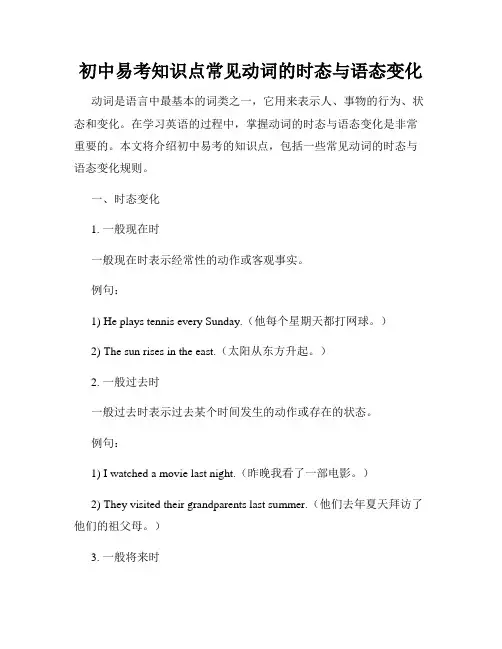
初中易考知识点常见动词的时态与语态变化动词是语言中最基本的词类之一,它用来表示人、事物的行为、状态和变化。
在学习英语的过程中,掌握动词的时态与语态变化是非常重要的。
本文将介绍初中易考的知识点,包括一些常见动词的时态与语态变化规则。
一、时态变化1. 一般现在时一般现在时表示经常性的动作或客观事实。
例句:1) He plays tennis every Sunday.(他每个星期天都打网球。
)2) The sun rises in the east.(太阳从东方升起。
)2. 一般过去时一般过去时表示过去某个时间发生的动作或存在的状态。
例句:1) I watched a movie last night.(昨晚我看了一部电影。
)2) They visited their grandparents last summer.(他们去年夏天拜访了他们的祖父母。
)3. 一般将来时一般将来时表示将来某个时间会发生的动作或存在的状态。
例句:1) We will have a party next week.(下周我们将举行一次聚会。
)2) She is going to visit her friend tomorrow.(她打算明天去看望她的朋友。
)4. 现在进行时现在进行时表示现在正在进行的动作。
例句:1) He is reading a book now.(他现在正在读一本书。
)2) They are playing football in the park.(他们正在公园里踢足球。
)5. 过去进行时过去进行时表示过去某个时间正在进行的动作。
例句:1) She was studying when I called her.(我给她打电话时,她正在学习。
)2) They were walking in the rain yesterday.(昨天他们在雨中走路。
)6. 现在完成时现在完成时表示过去发生的动作对现在造成的影响或结果。
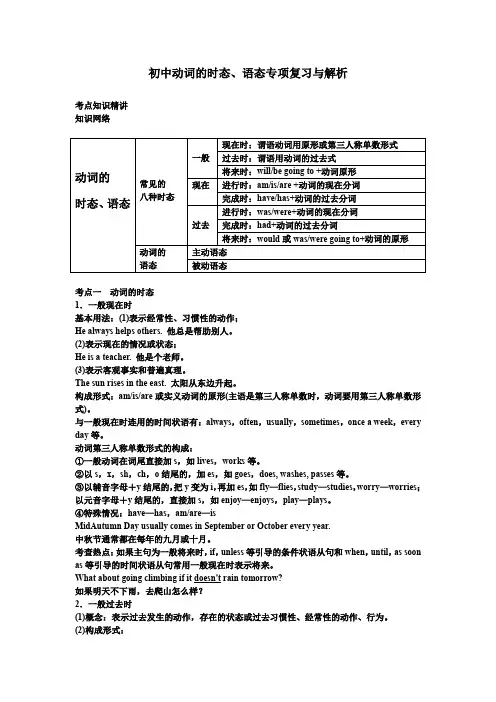
初中动词的时态、语态专项复习与解析考点知识精讲知识网络考点一动词的时态1.一般现在时基本用法:(1)表示经常性、习惯性的动作;He always helps others. 他总是帮助别人。
(2)表示现在的情况或状态;He is a teacher. 他是个老师。
(3)表示客观事实和普遍真理。
The sun rises in the east. 太阳从东边升起。
构成形式:am/is/are或实义动词的原形(主语是第三人称单数时,动词要用第三人称单数形式)。
与一般现在时连用的时间状语有:always,often,usually,sometimes,once a week,every day等。
动词第三人称单数形式的构成:①一般动词在词尾直接加s,如lives,works等。
②以s,x,sh,ch,o结尾的,加es,如goes,does, washes, passes等。
③以辅音字母+y结尾的,把y变为i,再加es,如fly—flies,study—studies,worry—worries;以元音字母+y结尾的,直接加s,如enjoy—enjoys,play—plays。
④特殊情况:have—has,am/are—isMidAutumn Day usually comes in September or October every year.中秋节通常都在每年的九月或十月。
考查热点:如果主句为一般将来时,if,unless等引导的条件状语从句和when,until,as soon as等引导的时间状语从句常用一般现在时表示将来。
What about going climbing if it doesn't rain tomorrow?如果明天不下雨,去爬山怎么样?2.一般过去时(1)概念:表示过去发生的动作,存在的状态或过去习惯性、经常性的动作、行为。
(2)构成形式:①肯定式:be(was,were);行为动词(过去式)②否定式:was/were+not;行为动词didn't+动词原形③疑问式:was/were+主语+其他;行为动词did+主语+动词原形(3)动词过去式的变化:动词过去式有规则变化和不规则变化两种情况,不规则变化应特别记忆。
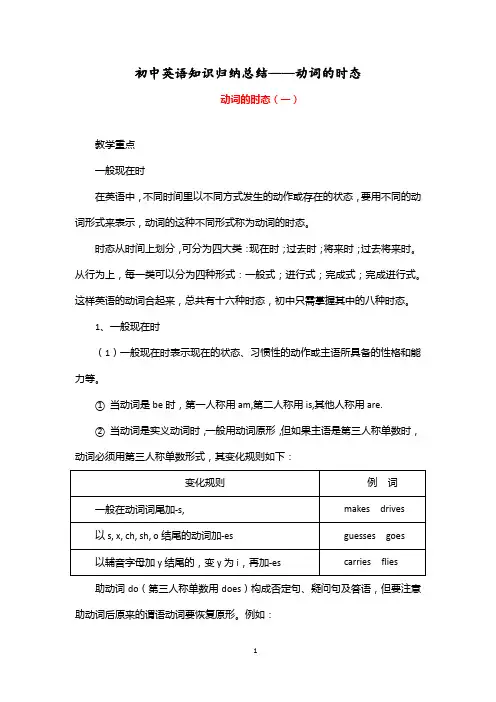
初中英语知识归纳总结——动词的时态动词的时态(一)教学重点一般现在时在英语中,不同时间里以不同方式发生的动作或存在的状态,要用不同的动词形式来表示,动词的这种不同形式称为动词的时态。
时态从时间上划分,可分为四大类:现在时;过去时;将来时;过去将来时。
从行为上,每一类可以分为四种形式:一般式;进行式;完成式;完成进行式。
这样英语的动词合起来,总共有十六种时态,初中只需掌握其中的八种时态。
1、一般现在时(1)一般现在时表示现在的状态、习惯性的动作或主语所具备的性格和能力等。
①当动词是be时,第一人称用am,第二人称用is,其他人称用are.②当动词是实义动词时,一般用动词原形,但如果主语是第三人称单数时,动词必须用第三人称单数形式,其变化规则如下:助动词do(第三人称单数用does)构成否定句、疑问句及答语,但要注意助动词后原来的谓语动词要恢复原形。
例如:I like music.I don’t like music.Do you like music?Yes, I do No, I don’t(2)一般现在时的用法①表示经常、习惯性动作,常和often, usually, every day, sometimes, always 等时间状语连用。
如:He goes to school by bus every day.They often play football②表示能力、职业、特征。
如:Miss Gao teaches English.Do you speak Japanese?③表示客观存在。
如:The earth moves round the sun.Time and tide wait for no man.④表示已经安排好或计划好的事。
如The plane takes off at 7:30.Classes begin at 8:00⑤在时间状语和条件状语从句中,主句用一般将来时,从句用一般现在时。
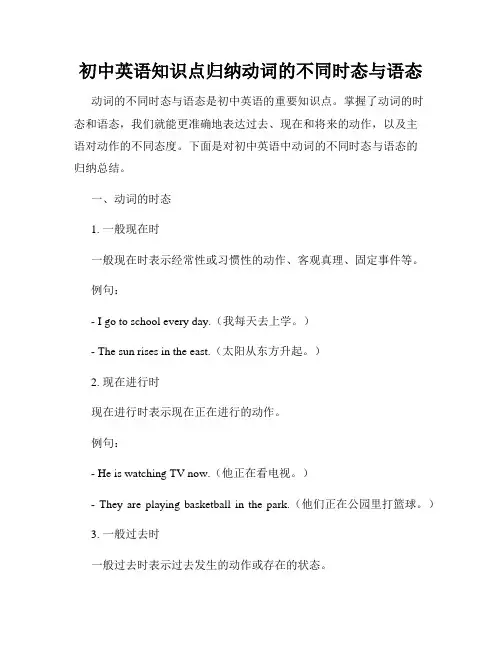
初中英语知识点归纳动词的不同时态与语态动词的不同时态与语态是初中英语的重要知识点。
掌握了动词的时态和语态,我们就能更准确地表达过去、现在和将来的动作,以及主语对动作的不同态度。
下面是对初中英语中动词的不同时态与语态的归纳总结。
一、动词的时态1. 一般现在时一般现在时表示经常性或习惯性的动作、客观真理、固定事件等。
例句:- I go to school every day.(我每天去上学。
)- The sun rises in the east.(太阳从东方升起。
)2. 现在进行时现在进行时表示现在正在进行的动作。
例句:- He is watching TV now.(他正在看电视。
)- They are playing basketball in the park.(他们正在公园里打篮球。
)3. 一般过去时一般过去时表示过去发生的动作或存在的状态。
例句:- We watched a movie last night.(昨晚我们看了一场电影。
)- She lived in Beijing when she was young.(她年轻时住在北京。
)4. 过去进行时过去进行时表示过去某个时间正在进行的动作。
例句:- They were having dinner at 7 o'clock yesterday.(昨天7点他们正在吃晚饭。
)- At this time last year, I was studying in London.(去年这个时间,我正在伦敦学习。
)5. 将来时将来时表示将要发生的动作或存在的状态。
例句:- We will go to the beach next week.(下周我们将去海滩。
)- She is going to visit her grandparents tomorrow.(她明天将要去看望她的祖父母。
)二、动词的语态1. 主动语态主动语态表示主语是动作的执行者。
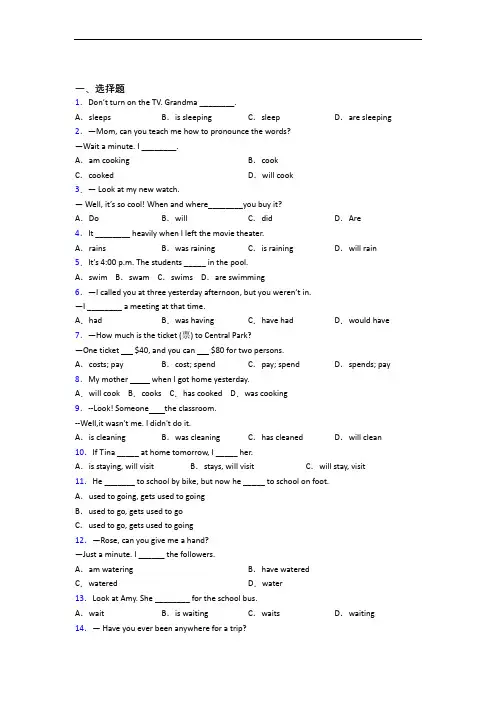
一、选择题1.Don’t turn on the TV. Grandma ________.A.sleeps B.is sleeping C.sleep D.are sleeping 2.—Mom, can you teach me how to pronounce the words?—Wait a minute. I ________.A.am cooking B.cookC.cooked D.will cook3.— Look at my new watch.—Well, it’s so cool! When and where________you buy it?A.Do B.will C.did D.Are4.It ________ heavily when I left the movie theater.A.rains B.was raining C.is raining D.will rain 5.It’s 4:00 p.m. The students _____ in the pool.A.swim B.swam C.swims D.are swimming6.—I called you at three yesterday afternoon, but you weren’t in.—I ________ a meeting at that time.A.had B.was having C.have had D.would have 7.—How much is the ticket (票) to Central Park?—One ticket $40, and you can $80 for two persons.A.costs; pay B.cost; spend C.pay; spend D.spends; pay 8.My mother when I got home yesterday.A.will cook B.cooks C.has cooked D.was cooking9.--Look! Someone the classroom.--Well,it wasn't me. I didn't do it.A.is cleaning B.was cleaning C.has cleaned D.will clean 10.If Tina _____ at home tomorrow, I _____ her.A.is staying, will visit B.stays, will visit C.will stay, visit 11.He _______ to school by bike, but now he _____ to school on foot.A.used to going, gets used to goingB.used to go, gets used to goC.used to go, gets used to going12.—Rose, can you give me a hand?—Just a minute. I ______ the followers.A.am watering B.have wateredC.watered D.water13.Look at Amy. She ________ for the school bus.A.wait B.is waiting C.waits D.waiting 14.— Have you ever been anywhere for a trip?— A trip? I ________ away from my hometown even once.A.went B.have gone C.have been D.have never been 15.The water ______ cool when I jumped into the pool for morning exercise.A.was felt B.is felt C.felt D.feels 16.While I_______ a detective story, someone_______ at the door.A.read, was knockingB.read, knockedC.was reading, knockedD.was reading, was knocking17.--What age did you leave home ?--I left home at 18. I ___your city for five yearsA.have gone to B.have been to C.have been in D.have come to 18.The film Operation Red Sea_____a lot of praise since its first show months ago. A.wins B.win C.will win D.has won 19.It’s 8 o’clock. The students _________ an English class.A.have B.having C.is having D.are having 20.—Did you hear the strange noise next door around 9 o’clock last night?— No, I ________my favourite film in my bedroom.A.watch B.watched C.am watching D.was watching 21.Don’t talk! The baby ________.A.sleeps B.is sleep C.sleeping D.is sleeping 22.— What do you use MP3 for?— I ________ it ________ to music.A.use; listen B.are listening; listeningC.use; to listen D.is listening; to listening23.My father was reading ________ I was sleeping.A.while B.when C.before D.after 24.Look! All my classmates ___________ on the playground.A.are running B.ran C.were running D.run25.—I can’t find Peter. Where is he?— He ______ tea in the living room.A.drinks B.drinking C.is drinking D.drink【参考答案】***试卷处理标记,请不要删除一、选择题1.B【解析】【分析】【详解】句意:别开电视,奶奶正在睡觉。
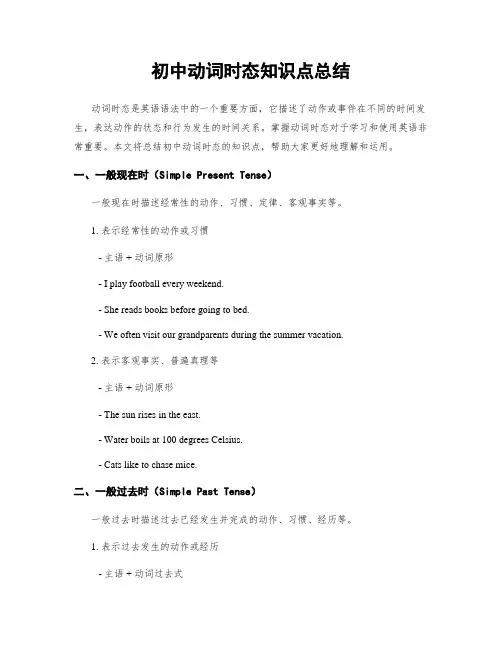
初中动词时态知识点总结动词时态是英语语法中的一个重要方面,它描述了动作或事件在不同的时间发生,表达动作的状态和行为发生的时间关系。
掌握动词时态对于学习和使用英语非常重要。
本文将总结初中动词时态的知识点,帮助大家更好地理解和运用。
一、一般现在时(Simple Present Tense)一般现在时描述经常性的动作、习惯、定律、客观事实等。
1. 表示经常性的动作或习惯- 主语 + 动词原形- I play football every weekend.- She reads books before going to bed.- We often visit our grandparents during the summer vacation.2. 表示客观事实、普遍真理等- 主语 + 动词原形- The sun rises in the east.- Water boils at 100 degrees Celsius.- Cats like to chase mice.二、一般过去时(Simple Past Tense)一般过去时描述过去已经发生并完成的动作、习惯、经历等。
1. 表示过去发生的动作或经历- 主语 + 动词过去式- I watched a movie last night.- She visited her friend yesterday.- We lived in London for five years.2. 表示过去的习惯- 主语 + used to + 动词原形- I used to go swimming every summer.- He used to play basketball when he was young.三、一般将来时(Simple Future Tense)一般将来时描述将来会发生的动作、计划、打算等。
1. 表示将来会发生的动作或计划- 主语 + will + 动词原形- I will visit my grandparents next week.- She will study abroad after finishing high school.- They will have a party for their anniversary.2. 表示意愿、决定和承诺- 主语 + be going to + 动词原形- I am going to start a new job next month.- He is going to learn how to play the guitar.- We are going to travel around the world in the future.四、现在进行时(Present Continuous Tense)现在进行时描述正在进行的动作、当前的情况和变化等。
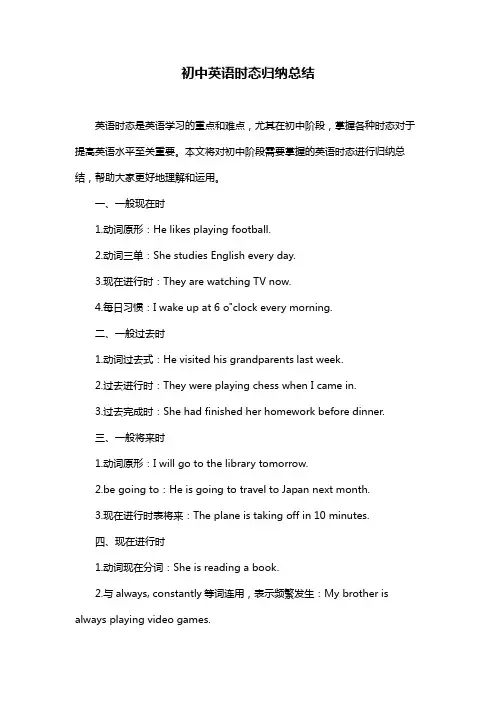
初中英语时态归纳总结英语时态是英语学习的重点和难点,尤其在初中阶段,掌握各种时态对于提高英语水平至关重要。
本文将对初中阶段需要掌握的英语时态进行归纳总结,帮助大家更好地理解和运用。
一、一般现在时1.动词原形:He likes playing football.2.动词三单:She studies English every day.3.现在进行时:They are watching TV now.4.每日习惯:I wake up at 6 o"clock every morning.二、一般过去时1.动词过去式:He visited his grandparents last week.2.过去进行时:They were playing chess when I came in.3.过去完成时:She had finished her homework before dinner.三、一般将来时1.动词原形:I will go to the library tomorrow.2.be going to:He is going to travel to Japan next month.3.现在进行时表将来:The plane is taking off in 10 minutes.四、现在进行时1.动词现在分词:She is reading a book.2.与always, constantly等词连用,表示频繁发生:My brother is always playing video games.五、过去进行时1.动词过去分词:They were discussing the project.2.与at that time, at this moment等词连用,表示在某个时间正在进行的动作:At that time, she was sleeping.六、完成时1.现在完成时:I have finished my homework.2.过去完成时:He had left the classroom before I arrived.七、被动语态1.一般现在时:The book is written by him.2.一般过去时:The window was broken by Tom.3.一般将来时:The letter will be sent to her tomorrow.总结:初中英语时态的学习需要掌握一般现在时、一般过去时、一般将来时、现在进行时、过去进行时、完成时和被动语态等。
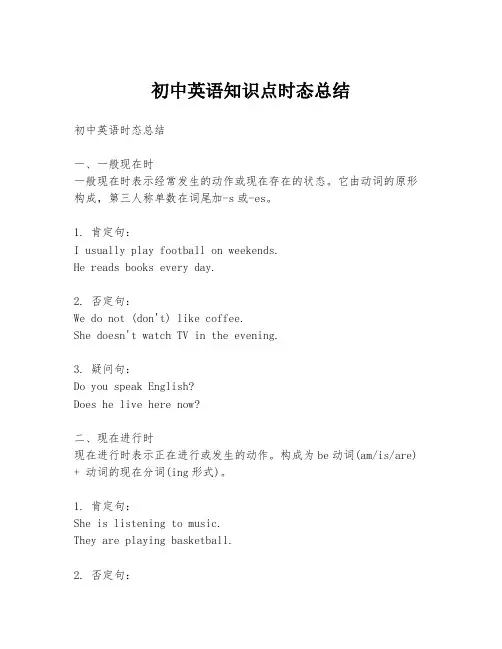
初中英语知识点时态总结初中英语时态总结一、一般现在时一般现在时表示经常发生的动作或现在存在的状态。
它由动词的原形构成,第三人称单数在词尾加-s或-es。
1. 肯定句:I usually play football on weekends.He reads books every day.2. 否定句:We do not (don't) like coffee.She doesn't watch TV in the evening.3. 疑问句:Do you speak English?Does he live here now?二、现在进行时现在进行时表示正在进行或发生的动作。
构成为be动词(am/is/are) + 动词的现在分词(ing形式)。
1. 肯定句:She is listening to music.They are playing basketball.2. 否定句:I am not (aren't) studying right now.The children are not (aren't) doing their homework.3. 疑问句:Is she cooking dinner?Are you waiting for someone?三、一般过去时一般过去时表示过去某个时间发生的动作或存在的状态。
规则动词在词尾加-ed,不规则动词则有特殊形式。
1. 肯定句:He walked to school yesterday.I visited my grandparents last week.2. 否定句:We did not (didn't) go to the cinema.She didn't buy anything at the store.3. 疑问句:Did you travel abroad last year?Did he finish his homework?四、过去进行时过去进行时表示过去某个时间点正在进行的动作。
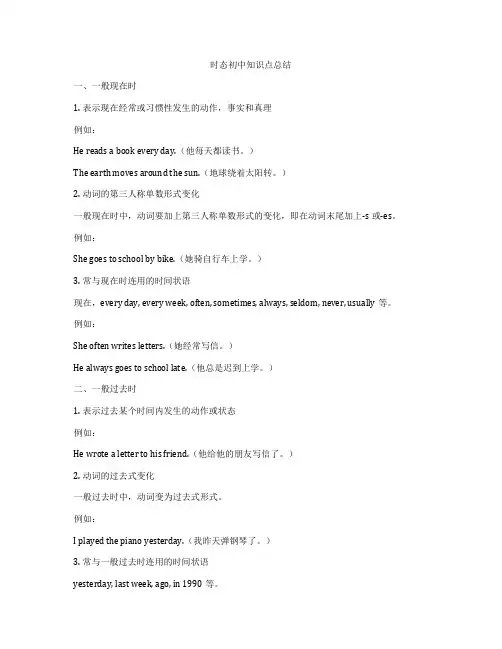
时态初中知识点总结一、一般现在时1. 表示现在经常或习惯性发生的动作,事实和真理例如:He reads a book every day.(他每天都读书。
)The earth moves around the sun.(地球绕着太阳转。
)2. 动词的第三人称单数形式变化一般现在时中,动词要加上第三人称单数形式的变化,即在动词末尾加上-s或-es。
例如:She goes to school by bike.(她骑自行车上学。
)3. 常与现在时连用的时间状语现在,every day, every week, often, sometimes, always, seldom, never, usually等。
例如:She often writes letters.(她经常写信。
)He always goes to school late.(他总是迟到上学。
)二、一般过去时1. 表示过去某个时间内发生的动作或状态例如:He wrote a letter to his friend.(他给他的朋友写信了。
)2. 动词的过去式变化一般过去时中,动词变为过去式形式。
例如:I played the piano yesterday.(我昨天弹钢琴了。
)3. 常与一般过去时连用的时间状语yesterday, last week, ago, in 1990等。
例如:She went to the park yesterday.(她昨天去了公园。
)They visited Beijing last year.(他们去年访问了北京。
)三、一般将来时1. 表示将来某个时间内要发生的动作或状态例如:I will go to Shanghai next weekend.(我下周末要去上海。
)2. will和be going to的用法will用于表达将来的意愿、打算或预测,而be going to用于表达计划或事先打算好的动作。
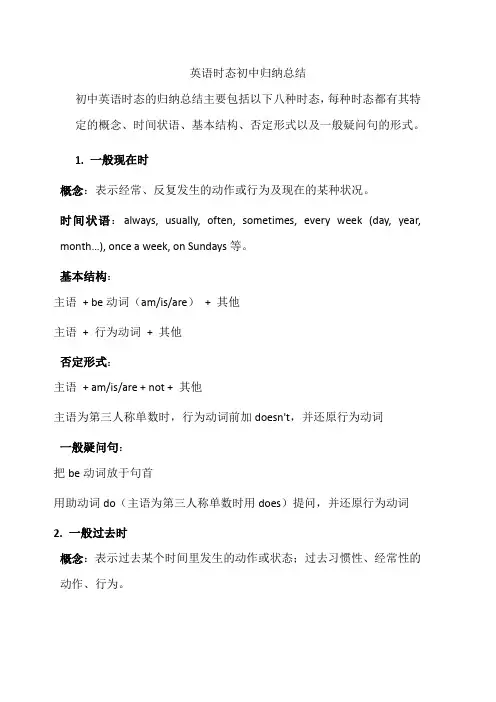
英语时态初中归纳总结初中英语时态的归纳总结主要包括以下八种时态,每种时态都有其特定的概念、时间状语、基本结构、否定形式以及一般疑问句的形式。
1. 一般现在时概念:表示经常、反复发生的动作或行为及现在的某种状况。
时间状语:always, usually, often, sometimes, every week (day, year, month…), once a week, on Sundays等。
基本结构:主语+ be动词(am/is/are)+ 其他主语+ 行为动词+ 其他否定形式:主语+ am/is/are + not + 其他主语为第三人称单数时,行为动词前加doesn't,并还原行为动词一般疑问句:把be动词放于句首用助动词do(主语为第三人称单数时用does)提问,并还原行为动词2. 一般过去时概念:表示过去某个时间里发生的动作或状态;过去习惯性、经常性的动作、行为。
时间状语:ago, yesterday, the day before yesterday, last week(year, night, month…), in 1989, just no w, at the age of 5, one day, long long ago, once upon a time等。
基本结构:主语+ be动词(was/were)+ 其他主语+ 行为动词(过去式)+ 其他否定形式:主语+ was/were + not + 其他在行为动词前加didn't,并还原行为动词一般疑问句:was或were放于句首用助动词do的过去式did提问,并还原行为动词3. 现在进行时概念:表示现阶段或说话时正在进行的动作及行为。
时间状语:now, at this time, these days等。
基本结构:主语+ am/is/are + doing + 其他否定形式:主语+ am/is/are + not + doing + 其他一般疑问句:把be动词放于句首4. 过去进行时概念:表示过去某段时间或某一时刻正在发生或进行的行为或动作。
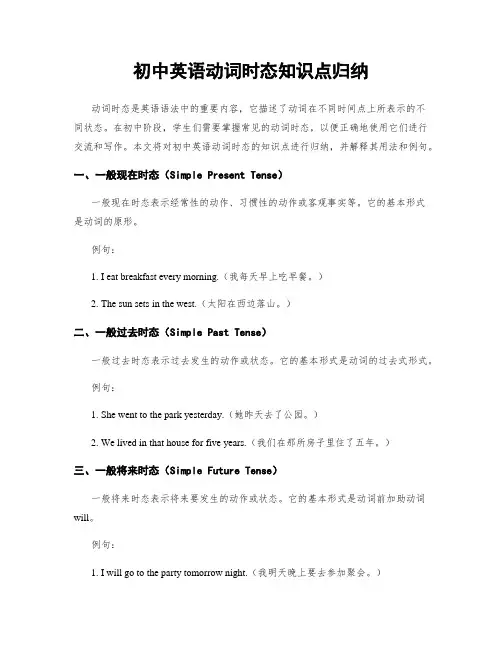
初中英语动词时态知识点归纳动词时态是英语语法中的重要内容,它描述了动词在不同时间点上所表示的不同状态。
在初中阶段,学生们需要掌握常见的动词时态,以便正确地使用它们进行交流和写作。
本文将对初中英语动词时态的知识点进行归纳,并解释其用法和例句。
一、一般现在时态(Simple Present Tense)一般现在时态表示经常性的动作、习惯性的动作或客观事实等。
它的基本形式是动词的原形。
例句:1. I eat breakfast every morning.(我每天早上吃早餐。
)2. The sun sets in the west.(太阳在西边落山。
)二、一般过去时态(Simple Past Tense)一般过去时态表示过去发生的动作或状态。
它的基本形式是动词的过去式形式。
例句:1. She went to the park yesterday.(她昨天去了公园。
)2. We lived in that house for five years.(我们在那所房子里住了五年。
)三、一般将来时态(Simple Future Tense)一般将来时态表示将来要发生的动作或状态。
它的基本形式是动词前加助动词will。
例句:1. I will go to the party tomorrow night.(我明天晚上要去参加聚会。
)2. The train will arrive at 10:00 AM.(火车将在上午10点到达。
)四、现在进行时态(Present Continuous Tense)现在进行时态表示正在进行的动作。
它的基本形式是be动词(am, is, are)加动词的现在分词形式(-ing结尾)。
例句:1. He is playing soccer in the park.(他正在公园里踢足球。
)2. They are studying for the exam.(他们正在为考试而学习。
)五、过去进行时态(Past Continuous Tense)过去进行时态表示过去某一时刻正在进行的动作。
中学重要知识点总结动词时态与语态详解动词时态与语态详解中学重要知识点总结动词时态和语态是英语语法中的重要内容,理解和正确使用它们对于学生的英语学习至关重要。
本文将对中学生常见的动词时态和语态进行详细解释和总结,帮助学生掌握这些知识点。
一、动词时态(Verb Tenses)动词时态用来表示动作发生的时间。
英语中常见的动词时态包括一般现在时、一般过去时、一般将来时等。
以下是各个时态的用法和举例:1. 一般现在时(Simple Present Tense)一般现在时用于表示经常性、习惯性或普遍真理的动作。
例如:- I play tennis every Sunday.(我每个星期天打网球。
)- She speaks English fluently.(她英语说得很流利。
)2. 一般过去时(Simple Past Tense)一般过去时用于表示过去某个确定的时间发生的动作。
例如:- We visited our grandparents last weekend.(我们上个周末拜访了我们的祖父母。
)- He played basketball when he was young.(他年轻时打篮球。
)3. 一般将来时(Simple Future Tense)一般将来时用于表示将来某个时间将要发生的动作。
例如:- They will go to the park tomorrow.(他们明天将去公园。
)- I am sure she will pass the exam.(我相信她会通过考试。
)4. 现在进行时(Present Continuous Tense)现在进行时用于表示现在正在进行的动作。
例如:- She is studying in the library now.(她现在正在图书馆学习。
)- They are playing football on the field.(他们正在场上踢足球。
)5. 过去进行时(Past Continuous Tense)过去进行时用于表示过去某个时间段内正在进行的动作。
初中重要知识点归纳动词时态与语态的用法总结初中重要知识点归纳:动词时态与语态的用法总结动词时态和语态是英语语法中的重要知识点,对于初中学生来说,掌握它们的正确用法至关重要。
本文将就动词时态和语态的概念、分类以及常见用法进行总结和归纳。
一、动词时态的定义动词时态是指动作或状态发生的时间,常见的动词时态包括:一般现在时、一般过去时、一般将来时、现在进行时、过去进行时、将来进行时、现在完成时、过去完成时和将来完成时。
以下将对每个时态进行详细介绍。
1. 一般现在时:表示经常发生的动作、客观真理以及现阶段的状态。
例如:- I go to school every day.(我每天去上学。
)- The sun rises in the east.(太阳从东方升起。
)2. 一般过去时:表示过去某个时间发生的动作或状态。
例如:- She visited her grandparents last week.(她上周去看望了她的祖父母。
)- They lived in that house for five years.(他们在那个房子里住了五年。
)3. 一般将来时:表示将来某个时间将要发生的动作或状态。
例如:- We will have a party next weekend.(我们下个周末将要举办一次派对。
)- He is leaving for London tomorrow.(他明天将离开去伦敦。
)4. 现在进行时:表示现在正在进行的动作。
例如:- I am reading a book.(我正在读一本书。
)- They are playing basketball in the park.(他们正在公园里打篮球。
)5. 过去进行时:表示过去某个时间正在进行的动作。
例如:- She was studying when I called her.(我给她打电话的时候,她正在学习。
)- We were watching a movie at that time.(那个时候我们正在看电影。
初中英语知识点归纳动词的时态和语态变化规则动词是英语语法中最为重要的一类词性,它能够表示动作、状态、行为等。
在使用动词时,我们需要根据不同的时间、语态等要素来灵活变化。
本文将对初中英语中动词时态和语态的变化规则进行归纳总结。
一、动词的时态变化规则1. 一般现在时(Simple Present Tense)- 表示经常性、习惯性或普遍真理:I play basketball every day.- 在第三人称单数形式上要加s或es:She reads books in her free time.- 否定形式在动词前加do not或does not:They do not like swimming.2. 一般过去时(Simple Past Tense)- 表示过去某个时间发生的动作或存在的状态:I visited my grandparents yesterday.- 大部分动词在动词原形后加ed:He worked hard last night.- 部分特殊动词有不规则变化形式:I saw a movie last night.3. 现在进行时(Present Continuous Tense)- 表示现在正在进行的动作:She is watching TV now.- 动词be的不同形式变化 + 现在分词形式进行时态构成:They are playing football in the park.4. 过去进行时(Past Continuous Tense)- 表示过去某段时间内正在进行的动作:He was studying when I called him.- 动词be的过去式 + 现在分词形式构成过去进行时态:They were playing chess last night.5. 现在完成时(Present Perfect Tense)- 表示发生在过去,但对现在有影响或结果的动作或状态:I have finished my homework.- 助动词have/has + 过去分词形式构成现在完成时态:He has lived in London for five years.6. 过去完成时(Past Perfect Tense)- 表示过去某一时间或动作之前已经发生的动作:She had already left when I arrived.- had + 过去分词形式构成过去完成时态:They had studied English for three years before they went abroad.7. 一般将来时(Simple Future Tense)- 表示将来某个时间将要发生的动作:They will have a meeting tomorrow.- 助动词will + 动词原形构成一般将来时态:I will send you the email later.8. 过去将来时(Future in the Past Tense)- 表示过去某个时间将要发生的动作:He said he would visit us the next day.- 助动词would + 动词原形构成过去将来时态:She told me she would help me with my homework.二、动词的语态变化规则1. 主动语态(Active Voice)- 句子的主语是动作的执行者:I write a letter.2. 被动语态(Passive Voice)- 句子的主语是动作的承受者,动作的执行者通常被省略:The letter is written by me.- 助动词be + 过去分词形式构成被动语态:The book was borrowed from the library.总结:初中英语中,动词的时态和语态变化规则是我们学习和掌握动词的重要内容。
初中英语动词时态总结初中英语动词时态总结动词时态是表示动作发生的时间的形式。
在英语中,动词时态分为四种基本时态:一般现在时、一般过去时、一般将来时和现在进行时。
此外,还有一些复合时态,如现在完成时、过去完成时和将来完成时等。
以下是对这些时态的详细总结。
一、一般现在时一般现在时表示经常性或习惯性的动作、客观真理、现实状态或普遍现象。
一般现在时的结构是主语+动词的原形(第三人称单数要加-s)。
1. 经常性或习惯性的动作:She often goes to the park on weekends.2. 客观真理:The earth revolves around the sun.3. 现实状态:I feel tired today.4. 普遍现象:People like to eat chocolate.二、一般过去时一般过去时表示在过去某个时间发生的动作或存在的状态。
一般过去时的结构是主语+动词的过去式。
1. 过去某个时间的动作:They went to the beach last summer.2. 过去存在的状态:She was a teacher before retirement.三、一般将来时一般将来时表示将要发生的动作或存在的状态。
一般将来时的结构是主语+will/won't+动词的原形。
1. 将要发生的动作:I will finish my homework tonight.2. 将要存在的状态:He will be a doctor in the future.四、现在进行时现在进行时表示正在进行的动作。
现在进行时的结构是主语+am/is/are+动词的ing形式。
1. 正在进行的动作:She is reading a book now.2. 临时状态:I am staying with my friends this week.五、现在完成时现在完成时表示过去发生的动作对现在造成的影响或结果。